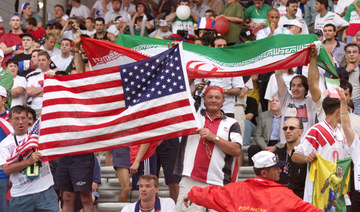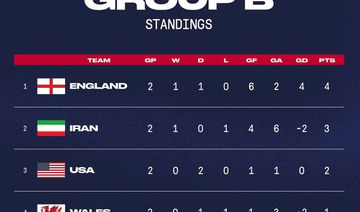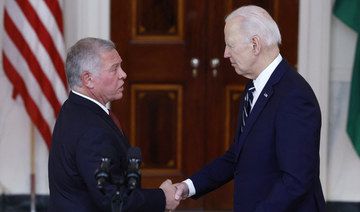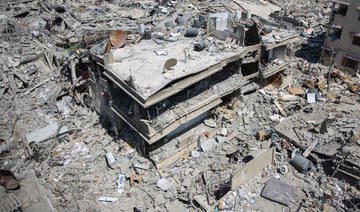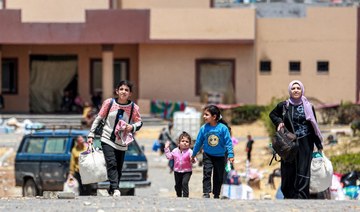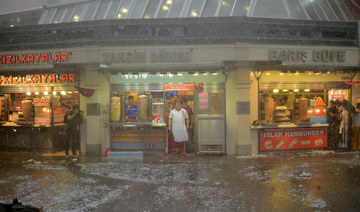BAGHDAD: The US team’s victory over Iran at the World Cup on Tuesday was closely watched across the Middle East, where the two nations have been engaged in a cold war for over four decades and where many blame one or both for the region’s woes.
Critics of Iran say it has fomented war and unrest across the Arab world by supporting powerful armed groups in Lebanon, Syria, Iraq, Yemen and the Palestinian territories. Supporters view it as the leader of an “axis of resistance” against what they see as US imperialism, corrupt Arab rulers and Israel’s oppression of the Palestinians.
The divide is especially intense in Lebanon and Iraq, where heavily armed Iran-backed political factions vie for political influence with opponents more oriented toward the West. In those countries, many believe Iran or the US are due for comeuppance — even if only on the pitch.
Others wished a plague on both their houses.
“Both are adversaries of Iraq and played a negative role in the country,” Haydar Shakar said in downtown Baghdad, where a cafe displayed the flags of both countries hanging outside. “It’s a sports tournament, and they’re both taking part in it. That’s all it is to us.”
A meme widely circulated ahead of Tuesday’s match between the US and Iran jokingly referred to it as “the first time they will play outside of Lebanon.” Another Twitter user joked that whoever wins the group stage “takes Iraq.”
The Iran-backed Hezbollah was the only armed group to keep its weapons after Lebanon’s 1975-1990 civil war. It says its arms are needed to defend the country from Israel and blames Lebanon’s economic crisis in part on US sanctions. Opponents decry Hezbollah as an “Iranian occupation,” while many Lebanese accuse both the US and Iran of meddling in their internal affairs.
In Iraq, the 2003 US-led invasion led to years of intense violence and sectarian strife, and Iran-backed political factions and militias largely filled the vacuum. While US forces and Iran-backed militias found themselves on the same side against the Islamic State extremist group, they have traded fire on several occasions since its defeat.
Both Lebanon and Iraq have had to contend with years of political gridlock, with the main dividing line running between Iran’s allies and opponents.
In Yemen, the Iran-aligned Houthi militia captured the capital and much of the country’s north in 2014. The Houthis have been at war since then with an array of factions supported by Saudi Arabia and the United Arab Emirates, two US allies.
In Syria’s civil war, Iran supported President Bashar Assad’s government against rebels, some supported by the West. In the Palestinian territories, it backs Hamas and Islamic Jihad, militant factions that do not recognize Israel and have carried out scores of attacks over the years.
Interviews with soccer fans in Beirut and Baghdad revealed mixed emotions about the match.
In Beirut’s southern suburbs, a center of Hezbollah support, young men draped in Iranian flags gathered in a cafe hung with a “Death to America” flag to watch the match.
“We are against America in football, politics and everything else,” Ali Nehme said. “God is with Lebanon and Iran.”
Across the city on the seafront promenade, Beirut resident Aline Noueyhed said, “Of course I’m not with Iran after all the disasters they made. Definitely, I’m with America.” She added, however, that the US also was “not 100 percent helping us.”
The post-game reaction in the streets of Beirut after the US defeated Iran 1-0, eliminating it from the tournament and advancing to the knockout round, was far more subdued than after the previous day’s win by Brazil — a fan favorite in Lebanon — over Switzerland.
In Baghdad, Ali Fadel was cheering for Iran, because “it’s a neighboring country, an Asian country.”
“There are many linkages between us and them,” he added.
Nour Sabah was rooting for the US because “they are a strong team, and (the US) controls the world.”
In Irbil in Iraq’s semi-autonomous Kurdish region in the north, fans also gave mixed reactions.
Twenty-seven-year-old Zainab Fakhri was rooting for the US to beat Iran “to punish the Iranian regime that has been oppressing the women’s revolution,” referring to recent protests there.
At the same cafe, Aras Harb, 23, was backing Iran. “We prefer them because my family were able to flee there during the war, and the Iranian people are kind.”
Saad Mohammad, 20, had been hoping for a tie, fearing that a win could worsen an already alarming security situation. If locals celebrate the win, he said, “I fear Iran will launch rockets at us.”
Although the Iran supporters were visibly upset at their loss, the crowd filed out after the game without incident.
Regional politics hovered over the last matchup, at the 1998 World Cup, when Iran famously defeated the US 2-1, eliminating it from the tournament. That came less than two decades after Iran’s Islamic Revolution toppled the US-backed shah and protesters overran the US Embassy, leading to a prolonged hostage crisis.
French riot police were on site at the stadium in Lyon that year, but they weren’t needed. The teams posed together in a group photo, and Iran’s players even brought white roses for their opponents.
In this year’s matchup, allegiances have been scrambled by the nationwide protests gripping Iran, with some Iranians openly rooting against their own team. The players declined to sing along to their national anthem ahead of their opening match, in what was seen as an expression of sympathy for the protests, but reversed course and sang ahead of their next one.
In some neighborhoods of Tehran, people chanted “Death to the dictator!” after the match, even though it was past midnight local time.
Danyel Reiche, a visiting associate professor at Georgetown University Qatar who has researched the politics of sports, said World Cup fandom is not necessarily an indicator of political affiliation, even in countries with deep divisions.
Local sports in Lebanon are “highly politicized,” with all the major basketball and soccer clubs having political and sectarian affiliations, he said. But when it comes to the World Cup — where Lebanon has never qualified to play — fans latch on to any number of teams.
That’s true across the region, where fans sporting Lionel Messi or Cristiano Ronaldo jerseys can be found from Gaza to Afghanistan.
“This is one of the few spheres where people have the liberty and freedom to choose a country that they simply like and not the country where they think there’s an obligation for them to be affiliated with it,” Reiche said.
US-Iran match mirrored a regional rivalry for many Arab fans
https://arab.news/6a3hp
US-Iran match mirrored a regional rivalry for many Arab fans
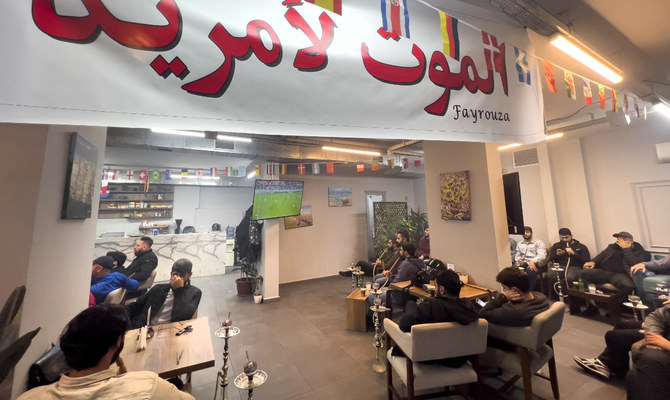
- Critics of Iran say it has fomented war and unrest across the Arab world by supporting powerful armed groups in Lebanon, Syria, Iraq, Yemen and the Palestinian territories
Palestinians seek UN General Assembly backing for full membership

- Diplomats say 193-member General Assembly likely to back Palestinian bid
- Others say move could set precedent for others, citing Kosovo and Taiwan as examples
UNITED NATIONS: The United Nations General Assembly could vote on Friday on a draft resolution that would recognize the Palestinians as qualified to become a full UN member and recommend that the UN Security Council “reconsider the matter favorably.”
It would effectively act as a global survey of how much support the Palestinians have for their bid, which was vetoed in the UN Security Council last month by the United States. An application to become a full UN member needs to be approved by the 15-member Security Council and then the General Assembly.
Diplomats say the 193-member General Assembly is likely to back the Palestinian bid. But changes could still be made to the draft after some diplomats raised concerns with the current text, seen by Reuters, that also grants additional rights and privileges — short of full membership — to the Palestinians.
Some diplomats say this could set a precedent for other situations, citing Kosovo and Taiwan as examples.
Israel’s UN Ambassador Gilad Erdan on Monday denounced the current draft General Assembly resolution, saying it would give the Palestinians the de facto status and rights of a state and goes against the founding UN Charter.
“If it is approved, I expect the United States to completely stop funding the UN and its institutions, in accordance with American law,” said Erdan, adding that adoption by the General Assembly would not change anything on the ground.
US CONCERNS
Under US law, Washington cannot fund any UN organization that grants full membership to any group that does not have the “internationally recognized attributes” of statehood. The US halted funding in 2011 for the UN cultural agency (UNESCO)after the Palestinians became a full member.
“It remains the US view that the path toward statehood for the Palestinian people is through direct negotiations,” said Nate Evans, spokesperson for the US mission to the UN
“We are aware of the resolution and reiterate our concerns with any effort to extend certain benefits to entities when there are unresolved questions as to whether the Palestinians currently meet the criteria under the Charter,” he said.
The Palestinians are currently a non-member observer state, a de facto recognition of statehood that was granted by the UN General Assembly in 2012. The Palestinian mission to the UN in New York did not immediately respond to a request for comment on its push for action in the General Assembly.
The Palestinian push for full UN membership comes seven months into a war between Israel and Palestinian militants Hamas in the Gaza Strip, and as Israel is expanding settlements in the occupied West Bank, which the UN considers to be illegal. The United Nations has long endorsed a vision of two states living side by side within secure and recognized borders.
Palestinians want a state in the West Bank, east Jerusalem and Gaza Strip, all territory captured by Israel in 1967.
Palestinians seek UN General Assembly backing for full membership
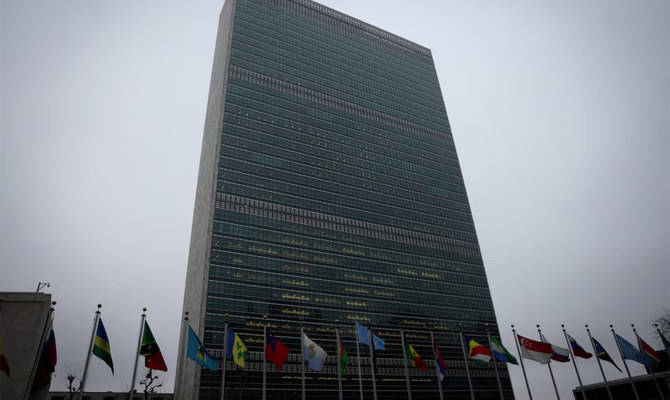
- Diplomats say the 193-member General Assembly is likely to back the Palestinian bid
UNITED NATIONS: The United Nations General Assembly could vote on Friday on a draft resolution that would recognize the Palestinians as qualified to become a full UN member and recommend that the UN Security Council “reconsider the matter favorably.”
It would effectively act as a global survey of how much support the Palestinians have for their bid, which was vetoed in the UN Security Council last month by the United States. An application to become a full UN member needs to be approved by the 15-member Security Council and then the General Assembly.
Diplomats say the 193-member General Assembly is likely to back the Palestinian bid. But changes could still be made to the draft after some diplomats raised concerns with the current text, seen by Reuters, that also grants additional rights and privileges — short of full membership — to the Palestinians.
Some diplomats say this could set a precedent for other situations, citing Kosovo and Taiwan as examples.
Israel’s UN Ambassador Gilad Erdan on Monday denounced the current draft General Assembly resolution, saying it would give the Palestinians the de facto status and rights of a state and goes against the founding UN Charter.
“If it is approved, I expect the United States to completely stop funding the UN and its institutions, in accordance with American law,” said Erdan, adding that adoption by the General Assembly would not change anything on the ground.
US CONCERNS
Under US law, Washington cannot fund any UN organization that grants full membership to any group that does not have the “internationally recognized attributes” of statehood. The US halted funding in 2011 for the UN cultural agency (UNESCO)after the Palestinians became a full member.
“It remains the US view that the path toward statehood for the Palestinian people is through direct negotiations,” said Nate Evans, spokesperson for the US mission to the UN
“We are aware of the resolution and reiterate our concerns with any effort to extend certain benefits to entities when there are unresolved questions as to whether the Palestinians currently meet the criteria under the Charter,” he said.
The Palestinians are currently a non-member observer state, a de facto recognition of statehood that was granted by the UN General Assembly in 2012. The Palestinian mission to the UN in New York did not immediately respond to a request for comment on its push for action in the General Assembly.
The Palestinian push for full UN membership comes seven months into a war between Israel and Palestinian militants Hamas in the Gaza Strip, and as Israel is expanding settlements in the occupied West Bank, which the UN considers to be illegal. The United Nations has long endorsed a vision of two states living side by side within secure and recognized borders. Palestinians want a state in the West Bank, east Jerusalem and Gaza Strip, all territory captured by Israel in 1967.
Palestinian, Egyptian officials say Israeli tanks move close to Gaza’s Rafah crossing with Egypt
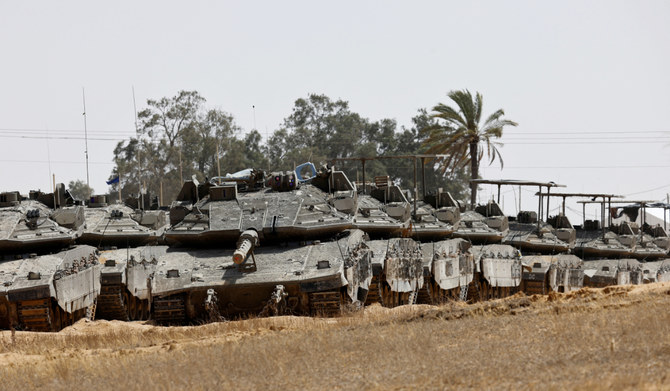
- Israel’s bombardment and ground offensives in Gaza have killed more than 34,700 Palestinians, around two-thirds of them children and women, according to Gaza health officials
- Israel’s War Cabinet decided to continue the Rafah operation, Prime Minister Benjamin Netanyahu’s office said
JERUSALEM: A Palestinian security official and an Egyptian official say Israeli tanks entered the southern Gaza town of Rafah, reaching as close as 200 meters (yards) from its crossing with neighboring Egypt.
The Egyptian official said the operation appeared to be limited in scope. He and Hamas’ Al-Aqsa TV said Israeli officials informed the Egyptians that the troops would withdraw after completing the operation.
The Israeli military declined to comment. On Sunday, Hamas fighters near the Rafah crossing fired mortars into southern Israel, killing four Israeli soldiers.
The Egyptian official, located on the Egyptian side of Rafah, and the Palestinian security official spoke on condition of anonymity because they were not authorized to talk to the press.
The Associated Press could not independently verify the scope of the operation.
Earlier Monday, Israel’s War Cabinet decided to push ahead with a military operation in Rafah, after Hamas announced its acceptance of an Egyptian-Qatari proposal for a ceasefire deal. The Israeli military said it was conducting “targeted strikes” against Hamas in Rafah without providing details.
Hamas announced its acceptance Monday of an Egyptian-Qatari ceasefire proposal, but Israel said the deal did not meet its “core demands” and that it was pushing ahead with an assault on the southern Gaza town of Rafah. Still, Israel said it would continue negotiations.
The high-stakes diplomatic moves and military brinkmanship left a glimmer of hope alive — but only barely — for an accord that could bring at least a pause in the 7-month-old war that has devastated the Gaza Strip. Hanging over the wrangling was the threat of an all-out Israeli assault on Rafah, a move the United States strongly opposes and that aid groups warn will be disastrous for some 1.4 million Palestinians taking refuge there.
Hamas’s abrupt acceptance of the ceasefire deal came hours after Israel ordered an evacuation of some 100,000 Palestinians from eastern neighborhoods of Rafah, signaling an invasion was imminent.
Israel’s War Cabinet decided to continue the Rafah operation, Prime Minister Benjamin Netanyahu’s office said. At the same time, it said that while the proposal Hamas agreed to “is far from meeting Israel’s core demands,” it would send negotiators to Egypt to work on a deal.
The Israeli military said it was conducting “targeted strikes” against Hamas in eastern Rafah. The nature of the strikes was not immediately known, but the move appeared aimed at keeping the pressure on as talks continue.
President Joe Biden spoke with Prime Minister Benjamin Netanyahu and reiterated US concerns about an invasion of Rafah. US State Department spokesman Matthew Miller said American officials were reviewing the Hamas response “and discussing it with our partners in the region.” An American official said the US was examining whether what Hamas agreed to was the version signed off to by Israel and international negotiators or something else.
It was not immediately known if the proposal Hamas agreed to was substantially different from one that US Secretary of State Antony Blinken pressed the militant group to accept last week, which Blinken said included significant Israeli concessions.
Egyptian officials said that proposal called for a ceasefire of multiple stages starting with a limited hostage release and partial Israeli troop pullbacks within Gaza. The two sides would also negotiate a “permanent calm” that would lead to a full hostage release and greater Israeli withdrawal out of the territory, they said.
Hamas sought clearer guarantees for its key demand of an end to the war and complete Israeli withdrawal in return for the release of all hostages, but it wasn’t clear if any changes were made.
Israeli leaders have repeatedly rejected that trade-off, vowing to keep up their campaign until Hamas is destroyed after its Oct. 7 attack on Israel that triggered the war.
Netanyahu is under pressure from hard-line partners in his coalition who demand an attack on Rafah and could collapse his government if he signs onto a deal. But he also faces pressure from the families of hostages to reach a deal for their release.
Thousands of Israelis rallied around the country Monday night calling for an immediate agreement. About a thousand protesters swelled near the defense headquarters in Tel Aviv, where police tried to clear the road. In Jerusalem, about a hundred protesters marched toward Netanyahu’s residence with a banner reading, “The blood is on your hands.”
Israel says Rafah is the last significant Hamas stronghold in Gaza, and Netanyahu said Monday that the offensive against the town was vital to ensuring the militants can’t rebuild their military capabilities.
But he faces strong American opposition. Miller said Monday the US has not seen a credible and implementable plan to protect Palestinian civilians. “We cannot support an operation in Rafah as it is currently envisioned,” he said.
The looming operation has raised global alarm. Aid agencies have warned that an offensive will bring a surge of more civilian deaths in an Israeli campaign that has already killed 34,000 people and devastated the territory. It could also wreck the humanitarian aid operation based out of Rafah that is keeping Palestinians across the Gaza Strip alive, they say.
UN High Commissioner for Human Rights Volker Türk on Monday called the evacuation order “inhumane.”
“Gazans continue to be hit with bombs, disease, and even famine. And today, they have been told that they must relocate yet again,” he said. “It will only expose them to more danger and misery.”
Israeli leaflets, text messages and radio broadcasts ordered Palestinians to evacuate eastern neighborhoods of Rafah, warning that an attack was imminent and anyone who stays “puts themselves and their family members in danger.”
The military told people to move to an Israel-declared humanitarian zone called Muwasi, a makeshift camp on the coast. It said Israel has expanded the size of the zone and that it included tents, food, water and field hospitals.
It wasn’t immediately clear, however, if that was already in place.
Around 450,000 displaced Palestinians already are sheltering in Muwasi. The UN agency for Palestinian refugees, known as UNRWA, said it has been providing them with aid. But conditions are squalid, with few sanitation facilities in the largely rural area, forcing families to dig private latrines.
Jan Egeland, secretary-general of the Norwegian Refugee Council, condemned the “forced, unlawful” evacuation order to Muwasi.
“The area is already overstretched and devoid of vital services,” Egeland said.
The evacuation order left Palestinians in Rafah wrestling with having to uproot their families once again for an unknown fate, exhausted after months living in sprawling tent camps or crammed into schools or other shelters in and around the city. Israeli airstrikes on Rafah early Monday killed 22 people, including children and two infants.
Mohammed Jindiyah said that at the beginning of the war, he tried to hold out in his home in northern Gaza under heavy bombardment before fleeing to Rafah.
He is complying with Israel’s evacuation order this time, but was unsure whether to move to Muwasi or elsewhere.
“We are 12 families, and we don’t know where to go. There is no safe area in Gaza,” he said.
Sahar Abu Nahel, who fled to Rafah with 20 family members, including her children and grandchildren, wiped tears from her cheeks, despairing at a new move.
“I have no money or anything. I am seriously tired, as are the children,” she said. “Maybe it’s more honorable for us to die. We are being humiliated.”
Israel’s bombardment and ground offensives in Gaza have killed more than 34,700 Palestinians, around two-thirds of them children and women, according to Gaza health officials. The tally doesn’t distinguish between civilians and combatants. More than 80 percent of the population of 2.3 million have been driven from their homes, and hundreds of thousands in the north are on the brink of famine, according to the UN
The war was sparked by the unprecedented Oct. 7 raid into southern Israel in which Palestinian militants killed around 1,200 people, mostly civilians, and abducted some 250 hostages. After exchanges during a November ceasefire, Hamas is believed to still hold about 100 Israelis as well the bodies of around 30 others.
Palestinian militants say they fired rockets from Gaza on Israel
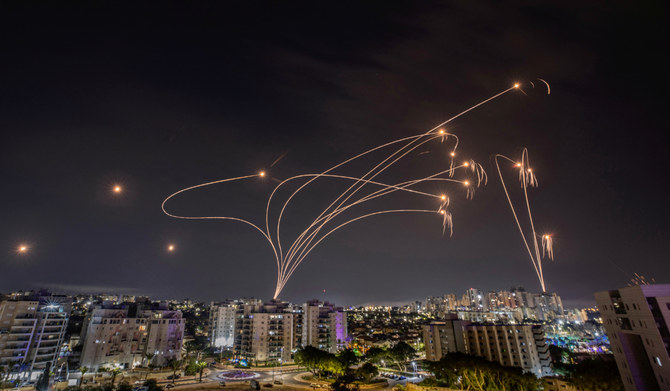
- The Israeli army said sirens sounded in communities near the Gaza Strip
- Israel has killed more than 34,600 Palestinians in Gaza, mostly women and children, according to the health ministry in the Hamas-run territory
GAZA CITY: The Palestinian Islamic Jihad’s armed wing said its militants had launched rockets from Gaza toward southern Israel on Monday in response to Israeli air strikes on the Palestinian territory.
“We have targeted Sderot, Nir Am, and settlements in the Gaza envelope with rocket barrages,” the Al-Quds Brigades said in a statement, referring to a zone of southern Israel close to Gaza.
The Israeli army said sirens sounded in communities near the Gaza Strip.
Erdogan opens former church to Muslim worshippers
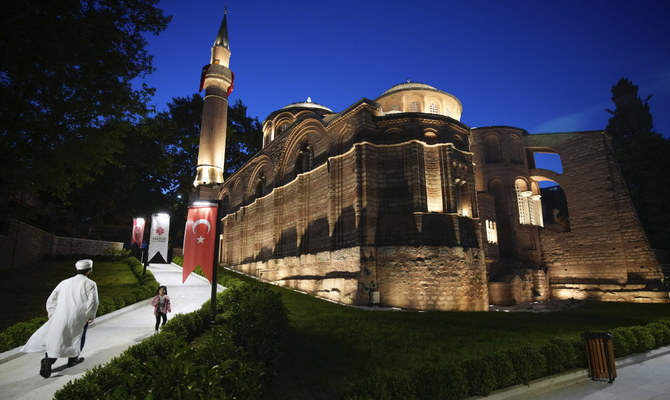
- Erdogan on Monday declared Kariye Mosque reopened for worship, remotely during a ceremony at the presidential palace in the capital, Ankara
ISTANBUL: Turkiye on Monday reopened a mosque converted from an ancient Orthodox church in Istanbul for Muslim worship, four years after the president ordered its transformation.
The Kariye Mosque was formerly a Byzantine church, then a mosque and then a museum.
President Recep Tayyip Erdogan, in 2020, ordered the building to be reconverted into a Muslim place of worship.
His order came followed a similarly controversial ruling on the UNESCO-protected Hagia Sophia — a cathedral in Istanbul that was converted into a mosque and then a museum, before becoming a mosque again.
The changes were seen as part of Erdogan’s efforts to galvanize his more conservative and nationalist supporters.
But they have also added to tensions with prelates in both the Orthodox and Catholic churches.
Erdogan on Monday declared Kariye Mosque reopened for worship, remotely during a ceremony at the presidential palace in the capital, Ankara.
An AFP picture from the mosque showed one worshipper wave a Turkish flag before the congregation who performed their prayers on a brick-red color carpet on Monday afternoon.
Images also revealed that two mosaics carved into the walls of the ancient church on the right and left sides of the prayer room were covered with curtains.
Most of the mosaics and frescos however remained visible to visitors.
“I had the opportunity to visit the place before and I was initially a little afraid of the work that could have been carried out,” said Michel, a French tourist, who would not give his full name.
“But ultimately we must recognize that it’s well done, that the frescos are accessible to everybody,” the 31-year-old researcher said.
Greece’s foreign affairs ministry on Monday night blasted a “provocation,” claiming that the move “alters the character” of the former church and “harms this UNESCO world heritage site that belongs to humanity.”
Neighbouring Greece had already reacted angrily to the decision in 2020 to convert the building.
The Holy Savior in Chora was a Byzantine church decorated with 14th-century frescoes of the Last Judgment that are still treasured by Christians.
The church was converted into Kariye Mosque half a century after the 1453 conquest of Constantinople by the Ottoman Turks.
It became the Kariye Museum after World War II, when Turkiye sought to create a more secular republic from the ashes of the Ottoman Empire.
A group of art historians from the United States helped restore the original church’s mosaics and they were put on public display in 1958.
Hagia Sophia — once the seat of Eastern Christianity — was also converted into a mosque by the Ottomans.
Ataturk, the founder of modern Turkiye after World War I, turned the UNESCO World Heritage site into a museum in a bid to promote religious neutrality.
Nearly 100 years later, Erdogan, whose ruling AKP party has Islamist roots, turned it back into a Muslim place of worship.
“It’s timeless, it’s something that for me is superior to Hagia Sophia,” Michel said of Kariye Mosque.
“It’s better preserved, less touristic and more intimate.”



